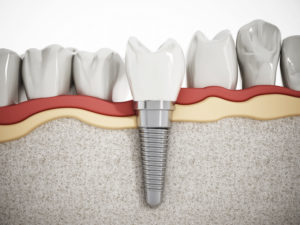 Tooth loss can happen for any number of reasons — and, whether it’s due to injury, insufficient oral hygiene, or genetics, it happens to people of all ages and stations of life. If you are already missing or on the brink of losing teeth, you need to find an effective replacement as soon as possible.
Tooth loss can happen for any number of reasons — and, whether it’s due to injury, insufficient oral hygiene, or genetics, it happens to people of all ages and stations of life. If you are already missing or on the brink of losing teeth, you need to find an effective replacement as soon as possible.
You have probably heard about dental implants in Harrisburg, but do you know how they work exactly? The science takes advantage of something called “osseointegration,” working with your existing oral structures to help you enjoy a fully-functioning smile once again. Keep reading to learn more about this comprehensive tooth replacement option and whether or not it’s right for you.
The Magic Behind Dental Implants
Dental implants actually fuse with your jawbone, becoming one with your oral structures to provide the ultimate in stability for your new teeth. It’s like growing a new bone to support your crown, bridge, or denture.
But how can that be possible?
The magic behind dental implants lies in the fact that they’re made of titanium, a material that bone tissue loves. It’s so excited when it encounters titanium that it actually boosts bone cell production, gradually growing around the implants to help them fully anchor in the jaw.
This wonderful process is called osseointegration, and it takes place over the course of four to six months after the dental implants have been placed. And it’s what we all have to thank for life after tooth loss!
Dental Implant Procedure
Dental implants are completed in two phases: implantation and restoration. Depending on the health of your jawbone to begin with, the entire procedure can take six months to one year or more to complete.
To begin, your dentist will evaluate whether or not you need to have a bone augmentation procedure performed before your implants can be placed. A bone graft or sinus lift can help to create the proper environment for the dental implants. Only once the jaw is healthy and strong are the implants surgically placed.
After the dental implants have healed and fused with your jaw some months later, they are ready to be restored. Your dentist will expose the dental implants, place connecting abutments on the top, and allow for one more brief healing period. The prosthetic crown, bridge, or denture can then be affixed to the abutments.
Are You a Candidate?
Many adults are eligible candidates for dental implants. If your tooth loss is recent and you are in good oral and overall health, chances are excellent that you can benefit from dental implants, too. The only way to know for sure is to visit your implant dentist!
Now that you know the secret that lies behind the success of this tooth replacement, don’t wait to get started on your new, complete smile.
About the Author
Dr. Gary M. Klein was recently named a Top 40 Dentist in the entire country by Incisal Edge Magazine. He offers a range of preventive, cosmetic, and restorative dentistry services, including dental implants. To learn more about your options in tooth replacement, you are invited to contact your dentist in Harrisburg at 717-652-6644.
